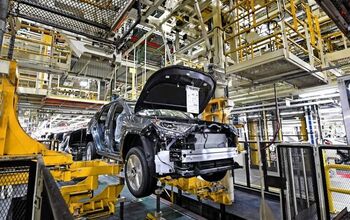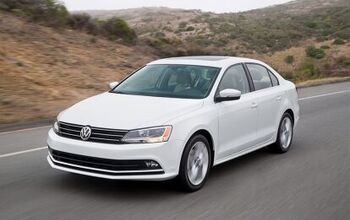Vehicle Recalls Are Down in the U.S., but Not Everyone's Celebrating

Automotive recalls in the United States dropped to the lowest level since 2013 last year. In 2017, domestic recalls fell to 30.7 million — far less than 2016’s record high of 53 million. That’s good news, right?
Probably. The National Highway Traffic Safety Administration demands manufacturers be Johnny-on-the-spot with fixes ever since General Motors’ ignition switch scandal back in 2014. That means it’s either gotten incredibly lax in its duties under Donald Trump’s watch or automakers simply had a better year. While the NHTSA suffered important staff shortages for literally all of 2017 and has seen the current administration pressing for less regulation overall, the recall decline could also be attributed to the Takata airbag inflator situation finally winding down.
However, it’s no secret that the Obama administration wanted to see the safety administration exercising its regulatory muscle. In 2016, automakers issued a record 924 recall campaigns. That number fell to 813 last year. The NHTSA has also neglected to impose new vehicle safety fines since Trump took office and been operating without permanent leadership for more than 13 months.
To some extent, this comes down to the Trump administration’s efforts to streamline the federal bureaucracy. But the confirmation process for presidential appointments can also be lengthy. The White House has repeatedly accused Democrats of dragging things out in response to so many nominees coming from the business world, rather than government. Regardless, many have become concerned with the National Highway Traffic Safety Administration’s lack of activity.
“This agency is in a stall … They are not going to do very much without political leadership,” said Joan Claybrook, a former NHTSA administrator and prominent consumer advocate, said last fall.
That may be true, however the fact remains that Takata’s airbag recall ultimately affected 42 million U.S. vehicles — with the vast majority cropping up before 2017. It would be presumptuous to accuse the NHTSA’s lax enforcement year as the sole cause of the safety recall decline. However, it might also be unwise to assume it isn’t allowing automakers to fly a few defects under the radar.
[Source: Reuters]

A staunch consumer advocate tracking industry trends and regulation. Before joining TTAC, Matt spent a decade working for marketing and research firms based in NYC. Clients included several of the world’s largest automakers, global tire brands, and aftermarket part suppliers. Dissatisfied with the corporate world and resentful of having to wear suits everyday, he pivoted to writing about cars. Since then, that man has become an ardent supporter of the right-to-repair movement, been interviewed on the auto industry by national radio broadcasts, driven more rental cars than anyone ever should, participated in amateur rallying events, and received the requisite minimum training as sanctioned by the SCCA. Handy with a wrench, Matt grew up surrounded by Detroit auto workers and managed to get a pizza delivery job before he was legally eligible. He later found himself driving box trucks through Manhattan, guaranteeing future sympathy for actual truckers. He continues to conduct research pertaining to the automotive sector as an independent contractor and has since moved back to his native Michigan, closer to where the cars are born. A contrarian, Matt claims to prefer understeer — stating that front and all-wheel drive vehicles cater best to his driving style.
More by Matt Posky
Latest Car Reviews
Read moreLatest Product Reviews
Read moreRecent Comments
- Kwik_Shift_Pro4X Style wise I'll give Volvo props for making boxy sporty. I would love one like this, but too much money pit potential.
- Jbltg Nope.
- ChristianWimmer This would be pretty cool - if it kept the cool front end of the standard/AMG G-Class models. The front ends of current Mercedes’ EVs just look lame.
- Master Baiter The new Model 3 Performance is actually tempting, in spite of the crappy ergonomics. 0-60 in under 3 seconds, which is faster than a C8 Corvette, plus it has a back seat and two trunks. And comparable in weight to a BMW M3.
- SCE to AUX The Commies have landed.


































Comments
Join the conversation
Clickbait, with no facts, just speculation. Thank you, St. George, for bringing at least a few facts into the picture. As a quasi-native of the DC swamp, I'm pretty familiar with how this works. The political appointees set the policy direction for the agency, the career people carry it out. Since most career people at regulatory agencies are regulators at heart, in the absence of contrary directions from the top, they're gonna regulate. So, in the absence of new leadership at the top, it's pretty unlikely that the career folks at NHTSA have given up regulating.
Recall rates dropping from all time highs doesn't necessarily mean enforcement is lacking. Recall rates started rising up in the 2007 era. If we're "the lowest since 2013", we're still higher than we used to be. Historically, 2013 was a very high year for recalls. Keep things in perspective. Recall rates are still very high and may simply be stabilizing.